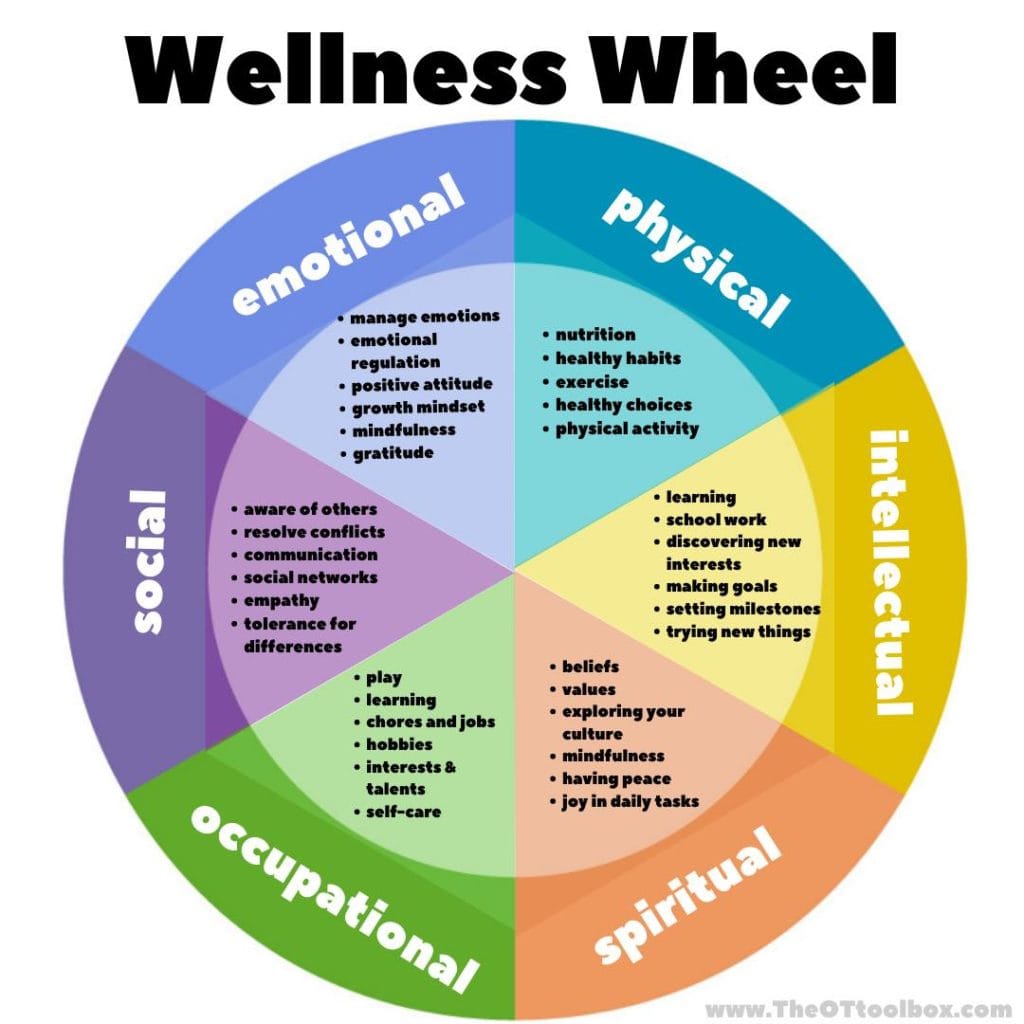Whilst practising mindfulness and meditation, we can teach ourselves that thoughts, emotions and feelings are fleeting, and rather than allowing them to define you, you can simply observe them from the outside.

The wellness wheel shows that all human needs can be broken down into six categories.
Emotional
Emotional needs are the essential feelings humans require to thrive, connect, and build meaningful relationships. At their core, these needs include love, acceptance, safety, and understanding. People crave acknowledgement of their feelings and experiences, a sense of belonging, and the assurance that they are valued. When these needs are met, individuals feel secure and confident, allowing them to express themselves freely and connect deeply with others.
Meeting emotional needs also involves trust and empathy, as humans flourish when they feel heard and supported. Positive affirmations, shared experiences, and honest communication are vital to nurturing these needs. On the other hand, neglecting emotional needs can lead to feelings of isolation, stress, and low self-esteem. By fostering environments where emotions are respected and validated, we create stronger bonds and promote emotional well-being for ourselves and those around us.
Physical
Physical needs are the basic requirements humans must fulfil to survive and maintain their health. These include essential things like food, water, shelter, and sleep. A balanced diet provides the nutrients and energy the body needs to function, while adequate hydration supports everything from digestion to brain function. Sleep is equally critical, allowing the body to repair and recharge, and shelter provides protection from environmental dangers and ensures a safe space to rest. Without these essentials, it becomes difficult for the body to sustain itself, leading to illness or other complications.
Beyond the basics, physical needs also include exercise, hygiene, and medical care. Regular physical activity strengthens muscles, boosts immunity, and enhances mental well-being. Good hygiene habits prevent infections and promote overall health, while access to healthcare ensures that illnesses and injuries are treated promptly. Meeting physical needs lays the foundation for a healthy and fulfilling life, empowering individuals to pursue their goals and enjoy the world around them.
Social
Social needs are the human desire for connection, belonging, and interaction with others. People thrive when they feel part of a community, whether it’s through family, friends, or larger social groups. These needs include love, companionship, and the sense of being understood and valued by others. Building relationships helps individuals share experiences, offer support, and feel less isolated. Meeting social needs creates a sense of belonging and contributes to emotional well-being.
These needs also involve communication, trust, and cooperation. Humans naturally seek environments where they can contribute and feel appreciated, whether at home, work, or in social circles. Positive social interactions, such as spending time with loved ones or working together toward common goals, fulfill this need. When social needs are met, people feel happier, more secure, and connected. Neglecting these needs, however, can lead to loneliness and stress, highlighting the importance of nurturing relationships and community bonds.
Intellectual
Intellectual needs are the human drive to learn, grow, and challenge the mind. People naturally crave opportunities to explore new ideas, solve problems, and develop their knowledge. This could involve reading, learning a new skill, engaging in creative activities, or even having stimulating conversations. Meeting these needs helps individuals stay curious, feel accomplished, and maintain a sharp mind. It also fosters a sense of purpose, as intellectual growth often leads to personal and professional achievements.
Beyond knowledge, intellectual needs also involve the desire to think critically and make sense of the world. Humans are naturally problem-solvers and seek answers to questions about how things work or why events happen. Fulfilling these needs promotes mental resilience and keeps the brain active. Whether through formal education, hobbies, or simply exploring personal interests, satisfying intellectual needs enhances creativity, boosts confidence, and helps people adapt to new challenges in life.
Occupational
Occupational needs are the human desire for meaningful work and a sense of purpose in what they do. People seek jobs or roles that not only provide financial stability but also align with their interests, skills, and values. Meeting these needs fosters a sense of accomplishment and pride in contributing to society. Whether through paid work, volunteering, or caregiving, fulfilling occupational needs gives individuals a structure to their day and a feeling of purpose and productivity.
Beyond the task itself, occupational needs also involve a supportive and respectful work environment. People thrive when they feel valued, respected, and given opportunities to grow professionally. Healthy relationships with colleagues, fair compensation, and work-life balance are essential for satisfaction. When these needs are met, individuals experience improved mental well-being, increased motivation, and better overall quality of life. A fulfilling occupation empowers people to reach their potential while contributing positively to their communities.
Spiritual
Human spiritual needs stem from the deep desire to find meaning, connection, and purpose in life. These needs often manifest as questions about identity, existence, and the bigger picture of life. People seek to understand who they are, why they are here, and what their life’s purpose might be. Meeting these needs involves cultivating a sense of inner peace, aligning one’s actions with personal values, and feeling connected to something greater than oneself—whether it’s a higher power, nature, or a shared human experience. Spiritual fulfilment often leads to emotional resilience and a sense of harmony in daily life.
Additionally, humans have a need for connection—not just with others, but also with the intangible aspects of life, such as hope, love, and beauty. This connection can be fostered through practices like meditation, prayer, spending time in nature, or simply reflecting on life’s wonders. Spiritual needs are not tied to a specific religion or belief system; they are universal and can be met in many ways. Whether through faith, art, relationships, or moments of quiet introspection, fulfilling these needs helps individuals feel grounded, purposeful, and whole.


